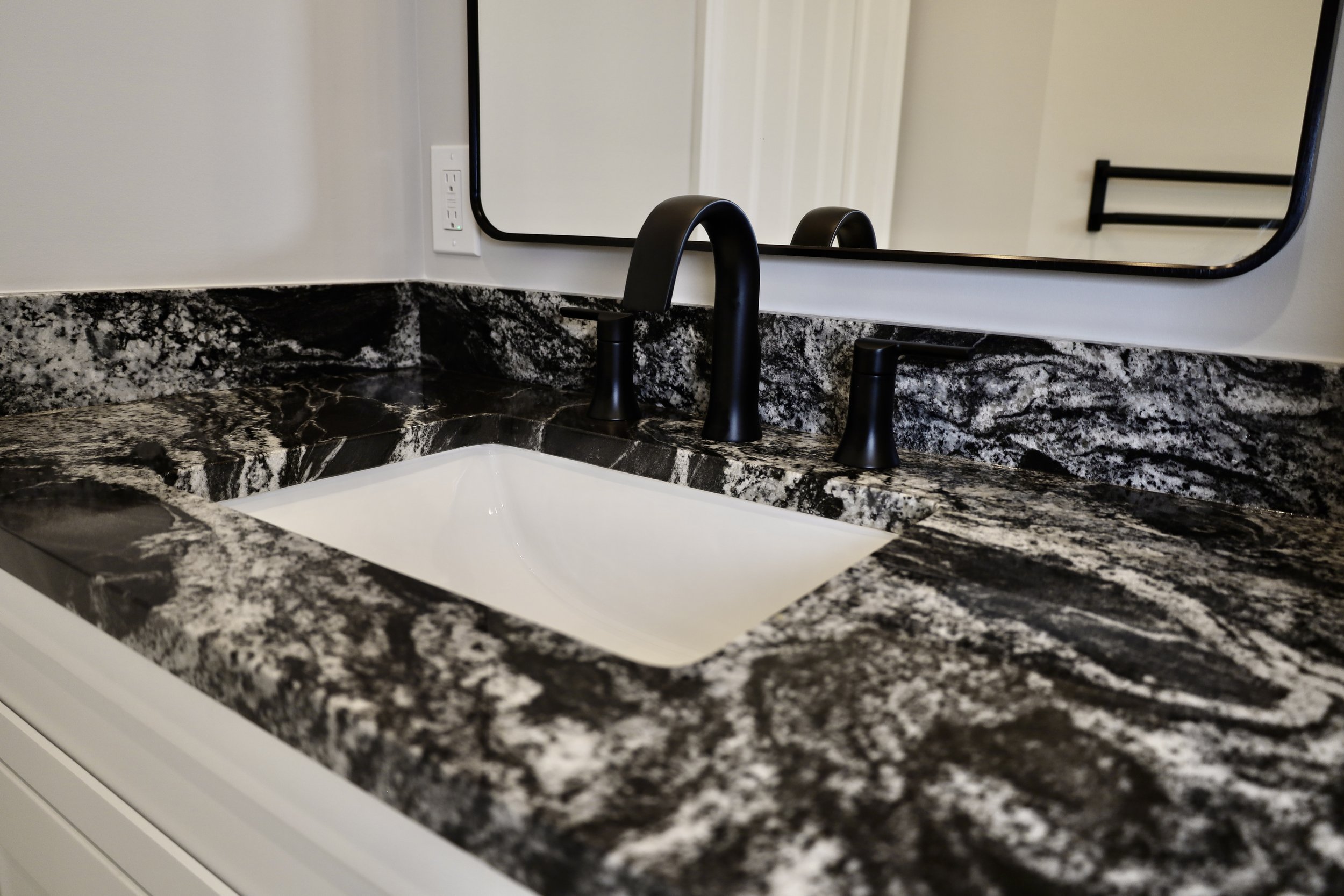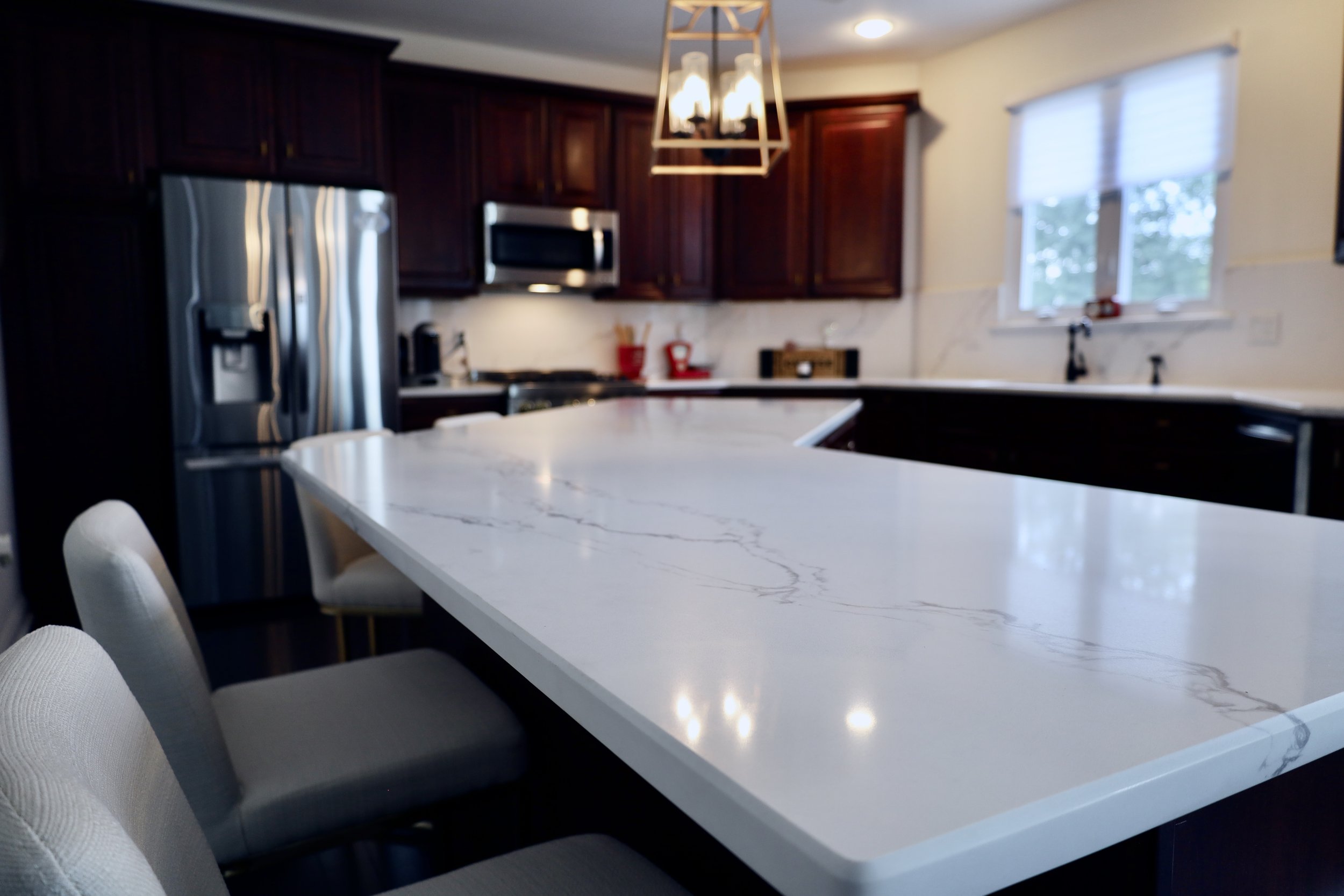What kind of countertop is right for me?
Choosing the right kind of countertop can be daunting with so many options. Weighing the benefits of each type of stone can help you in making your decision. With your countertop upgrade you can be assured that your final choice will add value to your home and last for many, many years. We’re going to lay out the pros and cons of granite, quartz, and quartzite so you can make an informed selection.
GRANITE
Granite countertops are very durable and popular for kitchens and bathrooms.
Here’s our list of PROS:
Durability: Granite is a very hard, dense material, making it highly resistant to scratches, chips, and cracks. It's also heat-resistant, so you can place hot pots and pans on it without worrying about damage.
Aesthetic Appeal: Granite has a natural beauty from volcanic with unique patterns and colors. Each slab is one-of-a-kind, which can add a touch of elegance and sophistication to your space.
Easy Maintenance: With proper sealing, granite countertops are relatively low maintenance. They are resistant to stains and are easy to clean with mild soap and water. Sealing helps prevent liquids from penetrating and staining the surface.
Increased Home Value: Granite countertops are often seen as a high-end feature, which can increase the resale value of your home. They are a popular choice among homebuyers and can make your property more appealing.
Longevity: Granite is a long-lasting material. With proper care, it can remain in good condition for many years, often outlasting other countertop materials.
Hygienic: Granite's non-porous surface (when properly sealed) makes it more resistant to bacteria and germs compared to some other materials. This can be particularly beneficial in food preparation areas.
Variety: Granite comes in a wide range of colors and patterns, so you can find something that suits your style and complements your kitchen or bathroom design.
Affordability: Granite will typically be your more affordable option compared to quartz and quartzite depending on what level slab you are selecting.
CONS:
Maintenance: While granite is durable, it requires regular sealing to maintain its resistance to stains and moisture. Failure to seal it regularly, preferably every one to two years, can lead to staining and damage.
Seams: Large countertops may require multiple slabs, which can result in visible seams. We are skilled at installation and will minimize the appearance of seams, but they might still be noticeable, especially with certain colors and patterns.
Chipping and Cracking: While granite is durable, it is not impervious to damage. Heavy objects dropped on the surface can cause chips or cracks, though these can often be repaired by a professional.
Porosity: Although granite is relatively stain-resistant, it is still porous. This means that spills, especially from acidic substances, can potentially penetrate the surface if not sealed properly.
QUARTZ
Quartz countertops have become highly popular in recent years. Along with the trending clean, white kitchen countertop look, quartz offers a marble appearance without the cost and high-maintenance of a marble surface.
Here’s our list of PROS:
Durability: Quartz is a very hard and durable material. It is resistant to scratches, dents, and cracks, making it an excellent choice for high-traffic areas.
Non-Porosity: Unlike natural stone, quartz countertops are non-porous. This means they do not require sealing and are less prone to staining and bacterial growth. Spills and messes can be easily cleaned with soap and water.
Consistency: Because quartz countertops are engineered, they offer a consistent pattern and color throughout the slab. This uniformity can be appealing for those who prefer a more predictable and even appearance.
Low Maintenance: Quartz countertops are relatively low maintenance compared to natural stone. They do not need to be sealed, and cleaning typically just requires mild soap and water.
Variety of Designs: Quartz countertops come in a wide range of colors and patterns, including options that mimic the look of natural stone like granite or marble. This variety allows you to find a style that suits your design preferences.
Stain Resistance: The non-porous surface of quartz makes it highly resistant to stains from spills such as coffee, wine, or citrus juices, which can be problematic for some natural stones.
Heat and Scratch Resistance: While not completely heat-proof, quartz countertops can withstand moderate heat and are less prone to scratches compared to some other materials. However, it's still a good idea to use trivets for very hot pots.
Eco-Friendly Options: Some quartz countertops are made from recycled materials, making them a more environmentally friendly choice compared to other options.
No Need for Sealant: Quartz countertops do not require periodic sealing, unlike granite, which needs regular upkeep to maintain its protective layer.
Ease of Repair: Small damage or scratches in quartz can often be repaired relatively easily by professionals, helping to maintain the countertop's appearance.
CONS:
Cost: Quartz countertops can be more expensive then a granite countertop.
Not Completely Heat-Proof: Quartz countertops are not completely heat-resistant. Placing very hot pots or pans directly on the surface can potentially damage the resin that binds the quartz crystals, leading to discoloration or cracking. It's best to use trivets or hot pads. We can give you a complimentary cutting board made from your slab for you to place hot pans on.
Seams: Large countertops may require multiple slabs, which can result in visible seams. We are skilled at installation and will minimize the appearance of seams, but they might still be noticeable, especially with certain colors and patterns.
Color and Pattern Limitations: While quartz comes in a wide range of colors and patterns, it may not offer the same level of natural variation and unique patterns as natural stones like granite or quartzite. Some people prefer the natural imperfections and character of natural stone.
Damage from Sharp Objects: Although quartz is durable, it can still be damaged by sharp objects. Cutting directly on the surface can cause scratches, so it’s recommended to use cutting boards to protect the countertop.
Potential for Chemical Sensitivity: Some quartz countertops may be sensitive to certain chemicals or cleaning products, which could potentially damage the surface over time. It’s important to use gentle, non-abrasive cleaners.
Repair Difficulty: While minor scratches can sometimes be repaired, more significant damage or chips might require professional attention. Depending on the extent of the damage, repairs can be challenging and may not perfectly match the original surface.
QUARTZITE
Quartzite countertops are becoming increasingly popular as their natural stone durability and unique patterns make them one of kind beauties.
Here’s our list of PROS:
Durability: Quartzite is a natural stone that is highly durable and resistant to scratches, chips, and cracks. Its hardness makes it suitable for high-traffic areas and heavy use.
Heat Resistance: Quartzite is heat-resistant, making it a practical choice for kitchens where hot pots and pans are frequently used. It can handle high temperatures without being damaged.
Aesthetic Appeal: Quartzite has a natural beauty with a range of colors and patterns, often featuring striking veining and texture. It can resemble marble but offers greater durability, making it an attractive option for a variety of design styles.
Uniqueness: As a natural stone, each slab of quartzite is unique, with its own distinct color variations and patterns. This individuality can add a one-of-a-kind element to your space.
Low Maintenance: Quartzite is relatively low-maintenance compared to some other natural stones. While it does require sealing to maintain its stain resistance, it is generally easy to clean with mild soap and water.
Stain Resistance: Once properly sealed, quartzite countertops are resistant to stains from common kitchen spills, such as wine, coffee, and oil. This helps in maintaining the countertop’s appearance over time.
Value Addition: Quartzite countertops are considered a high-end option that can increase the value of your home. Their natural beauty and durability can be appealing to potential buyers.
Natural Stone Benefits: Like other natural stones, quartzite is not manufactured and does not contain synthetic materials. This can be a positive aspect for those seeking a purely natural product.
Longevity: Quartzite is known for its longevity and can last for decades with proper care. Its resistance to wear and tear means it remains a viable option for long-term use.
Versatility: Quartzite works well in various settings, from modern to traditional designs. Its range of colors and textures can complement many different styles of decor.
CONS:
Cost: Quartzite is the most expensive compared to quartz and granite. However because of it’s longevity it may be worth the cost of the added valye to your home.
Sealing Required: Quartzite is porous and requires regular sealing, at least once a year to maintain its stain resistance. Without proper sealing, it can absorb liquids and potentially stain or damage the surface.
Color and Pattern Variability: Although the natural variation can be a benefit, it can also be a downside. The patterns and colors in quartzite can vary significantly between slabs, which might lead to inconsistencies if you are using multiple slabs or if the natural look is not aligned with your design vision.
Vulnerability to Acidic Substances: While quartzite is more resistant to acids than marble, it can still be vulnerable to acidic substances such as lemon juice or vinegar. Prolonged exposure can etch or dull the surface.
Potential for Cracking: Although quartzite is durable, it can still crack if subjected to extreme impacts or stress. This is less common but something to consider, especially in high-use areas.



